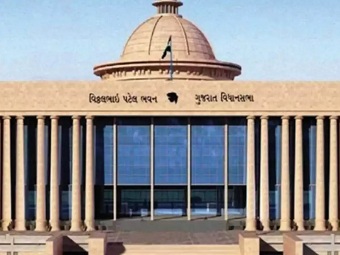The Gujarat Assembly has unanimously passed a Bill which seeks to make it mandatory to install CCTV systems, including face detection cameras, at certain categories of establishments and at public places as well as traffic junctions.
The ‘Gujarat Public Safety (Measures) Enforcement Bill’ was passed unanimously with Congress support after Minister of State for Home Harsh Sanghavi cleared the opposition party’s doubts, mainly pertaining to potential misuse of the legislation
The Bill essentially seeks to standardise CCTV camera networks and provide access of video footage to law enforcement agencies for the purpose of prevention, detection and investigation of criminal cases, said Sanghavi while tabling the Bill.
“A large number of CCTV cameras have been installed in the state to improve the safety and security of citizens. There is an urgent need for strengthening such safety measures, especially when Gujarat has witnessed rapid industrialisation and expansion of business activities” said the minister.
“This Bill seeks to make installation of CCTV camera systems mandatory for commercial and industrial establishments, malls, religious places, hospitals, sports complexes, railway and bus stations, and some other places, including private property, which attract large numbers of people and are vulnerable to crime ,” he added.
CCTV cameras should also be installed at entry and exit points of establishments, traffic junctions and designated parking areas, Sanghavi said. “CCTV cameras are helping police in detecting crimes. We already have a network at present. With this Bill, we want to standardise it. We will also install face detection cameras connected to the central control room. Such cameras can detect suspects by scanning the faces of people passing from an area,” said the minister.
The Bill mandates that owners and managers of establishments such as malls will be required to install CCTV cameras and store the video footage for a period at least 30 days and provide the same as and when required by the authority, according to the document tabled in the House.
It also provides for establishment of a Public Safety Committee as well as sub-committees for one or more areas. This committee will identify the establishments to be covered under the law and maintain their records, among other functions.
If the owner fails to comply with the instructions and orders given by the committee, the panel can impose a fine of Rs 10,000 for the first month of default and Rs 25,000 per month for the subsequent months of default, reads the document








